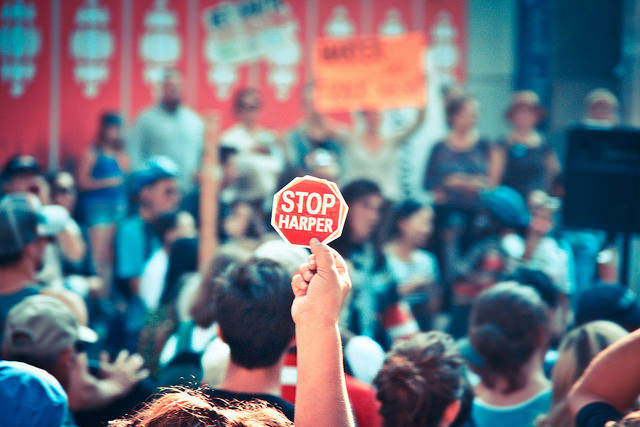Like this story? Chip in to keep labour stories like these coming.
Outstanding political leaders inspire, motivate, and rally support. Whether it be Churchill in wartime, De Gaulle in exile, or Indira Gandhi campaigning for the eradication of poverty, these leaders stood out because people responded to the calls for action.
It is a law of politics: to make things happen, people have to be mobilized. The political party that succeeds is the one that builds support, and gets people to vote for it.
How you do that is not easy. Fine leaders help, but since exceptional ones are few and far between, something more is required. Just what exactly is controversial.
We know that in politics, unlike in science, or even business, no one can be right all by themselves. Start-ups may work in high tech, or in science labs, but beginning from nothing is much harder in politics, where success is measured by how many people will join forces with you, not by how your journal article or consumer product is received. This is what makes life difficult for Elizabeth May and the Green Party, for example.
It is a mistake to think of politics as a form of extended debate about ideas and policies that takes place before a passive audience of voters. Some number of people do weigh what is on offer from the parties and make a “rational” choice, but these swing voters, or vote switchers, are a minority.
Regular voters tend to identify with one party rather than another, or are fully partisan, not willing to change their party preference. The trick for parties is to engage these regular voters, activate them, and, harder still, expand the number of supporters.
It is hard to generate voting support for a positive program of action when people have little or no attachment to the political process. Jack Layton was able to win 59 seats (out of 75) in Quebec because politics plays a big role in the life of that province.
Party supporters need to hear policies they can identify with for sure, but generating wider public engagement with politics requires more than policy development.
The main challenge for opposition politics is to paint the ruling party as worn out, finished, and due to be replaced. If the government and its leader can be seen to be disgraced, it is even better: it alerts citizens to the need for a new government.
Getting the attention of the non-voting public is more and more difficult. Voter participation in federal elections has fallen to the six out of 10 range, from the eight out of 10 range a generation ago.
Governing and opposition parties alike run into real trouble when supporters get convinced to de-mobilize, and stay home until further notice. Knowing this, voter suppression tactics have become common practice.
In the 2011 federal election, Liberals staying home allowed the Conservative government to win 44 per cent of those who turned up to vote in Ontario, and produced an improbable Harper majority government.
Political strategists work overtime on demonizing opponents. Negative advertising overshadows positive messaging because it is effective.
For European centre-left parties, governing from the centre right has been judged to be the way of broadening support. The problem with this course of action — known as Blairism in the U.K. after Labour Party prime minister Tony Blair — is it alienates core supporters and fails to attract new ones.
The crisis of European social democracy results from a willingness to march to media framing of issues. Left parties trying to outfox the opposition by adopting right-wing austerity programs end up presiding over economic stagnation and stubborn unemployment.
Centre-left parties such as the NDP come under pressure to promote balanced budgets, endorse free trade deals, and support privatization. Doing so is sure to leave party faithful unhappy, and create apathy among voters looking for a change.
In an era of the permanent election campaign, with just over six months before a scheduled October election, closer attention is being paid to what can be done to mobilize for, and especially against, the Harper Conservative government.
Under federal legislation governing political spending, there are no limits on so-called third-party campaign activity prior to an election being called.
Those seeking to influence election outcomes can take out ads, fund volunteers, and campaign openly for their favoured political options in the next months before the election writ is dropped.
Voting out the Harper government requires turning non-voters into anti-Harper voters, turning potential Harper voters into stay-at-home non-voters, and partisans into anybody-but-Harper voters.
The Canadian Labour Congress has held 17 organizational meetings across Canada to generate opposition to the Harper government, and plans to hold 17 more.
Noting this, Harper-friendly business organizations are being recruited by Conservative operatives to counter the implication of labour in electoral politics.
Mobilization for the next election is well underway.
Duncan Cameron is the president of rabble.ca and writes a weekly column on politics and current affairs.
Photo: Chris Yakimov/flickr
Like this story? Chip in to keep labour stories like these coming.



